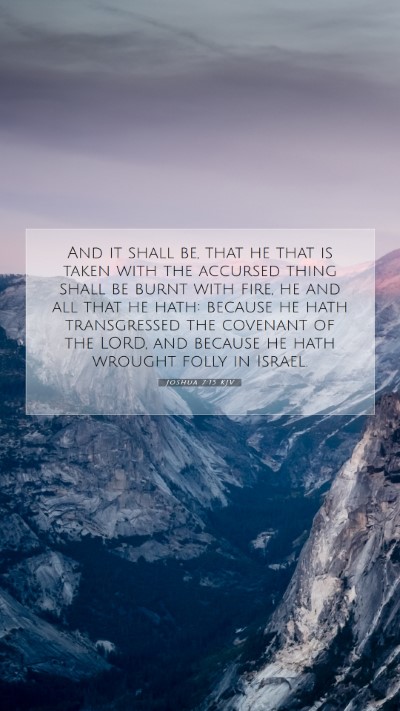Bible Verse Commentary for Joshua 7:15
Verse Text: "And it shall be, that he that is taken with the accursed thing shall be burnt with fire, he and all that he hath; because he hath transgressed the covenant of the LORD, and because he hath wrought folly in Israel."
Understanding the Context
This verse comes from the narrative of Israel's conquest of Canaan, specifically highlighting a pivotal moment after the fall of Jericho. The sin of Achan, who took a portion of the spoils that were set apart for destruction, ultimately leads to Israel's defeat at Ai. This passage illustrates the serious repercussions of disobedience to God's commands.
Bible Verse Meanings and Interpretations
The command regarding Achan's punishment can be understood through various theological lenses. Here are insights gathered from renowned public domain commentaries:
-
Matthew Henry's Commentary:
Henry emphasizes the gravity of sin in relation to God's covenant with Israel. He explains that Achan’s transgression represents not merely a theft but a betrayal of Israel’s calling as God’s chosen people. The severity of his punishment illustrates the principle that sin brings communal consequences.
-
Albert Barnes' Notes:
Barnes interprets the term "accursed thing" as something devoted to destruction, indicating the sacred nature of what God commands. He outlines Achan's act as both a violation of divine law and an act of folly, suggesting that his actions reflect a misunderstanding or disregard for the holiness of God’s edicts.
-
Adam Clarke's Commentary:
Clarke provides a historical context, noting how such a punishment may seem harsh by contemporary standards but underscores the importance of obedience in the ancient Israelite community. He also discusses the procedural elements of justice in Israel and how Achan's family was involved in his sin, which brings to light the collective responsibility within faith communities.
Theological Implications
This verse raises significant theological implications about sin, judgment, and community. It serves as a reminder that the actions of an individual can impact the entire community. Additionally, it emphasizes the seriousness with which God views disobedience, reinforcing the necessity of faithfulness to His commands.
Application of Joshua 7:15
For modern readers, Joshua 7:15 invites introspection regarding our own lives and how personal actions may affect others. This scripture calls us to a deeper understanding of collective responsibility within our communities, urging believers to uphold the standards set by God.
Cross References
- Joshua 6:18-19: The command regarding dedicated items during the fall of Jericho.
- Numbers 32:23: The principle that sin will find you out.
- Galatians 6:7: The law of sowing and reaping, connected to consequences of actions.
- 1 Corinthians 5:6-7: The impact of sin within a community.
- Revelation 21:8: The ultimate fate of unrepentant sinners.
- 2 Chronicles 36:16: The importance of heeding God's warnings.
Conclusion
This commentary utilizes insights from historical theological perspectives to shed light on Joshua 7:15. By understanding this verse within its narrative context and its broader implications, believers can better appreciate the weight of biblical teachings and apply them within our spiritual journeys.


